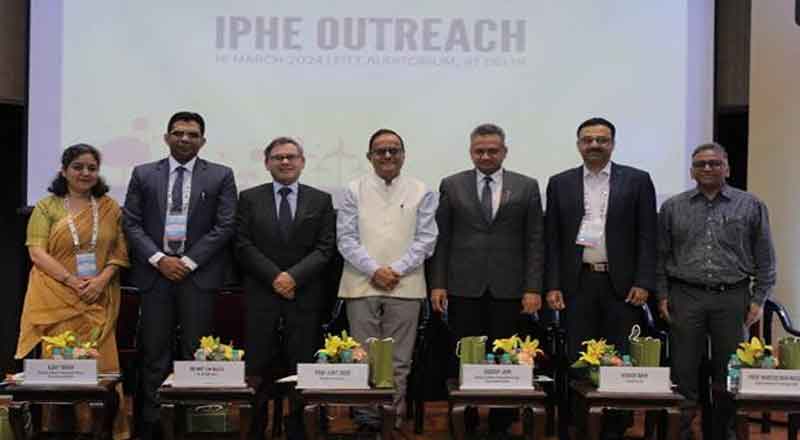In a budget deficient country like India, it is important for any company to undertake CSR activities as a way of giving back to the environment in which it is operating and doing business in. But there are several challenges that stand as a roadblock in the implementation of good CSR –
Philanthropy has always been an inevitable and integral part of businesses in India. There has been a gradual hike in the number of companies focusing on CSR strategies to ensure that they involve communities in a meaningful manner and aim at making a revolutionary impact. CSR is believed to evolve substantially in the next few years and it would soon become the backbone of business’s overall strategy.
“Social accountability by corporates is a powerful tool to drive progress in the societies and communities. By ensuring that companies leverage their efforts ethically, returning to the society also plays a part in chalking out a responsible path for all of us to conduct business in the marketplace,” asserts Rajeev Kapoor, Vice President and CSR Champion at Dell Technologies India.
Best Practices for Social initiatives
For any CSR activity to be effective it must be meaningful and sustainable. While corporates may engage in a lot of CSR activities, they need to analyze how impactful their activity has been and how sustainable it is to continue for a long term.
Dr Mukesh Batra, Founder – Dr Batra’s Group of Companies discusses the following best practices which he thinks every organization should consider for doing any social initiatives –
Impact Assessment: This is one of the most crucial and at the same time the most over-looked aspect of any CSR activity. Right from the beginning, Dr Batra’s Foundation conducts impact assessments of all CSR activities which help the company to measure its impact on people’s lives. This exercise also helps to identify which activities are actually benefitting the masses and helps in identifying gaps, if any. In 2016 alone Dr Batra’s has impacted over 60,000 lives through its various programmes like Feed a Child, Free Clinics and NGO tie-ups.
Unique funding model: “We started the Dr Batra’s Foundation much before CSR became fashionable. Unlike other companies, Dr Batra’s Foundation follows a unique operating model that makes it completely self-reliant through self funding. As a voluntary exercise, every employee at Dr Batra’s contributes 1% of his salary to the Foundation every month. Similarly, 1% of the organization’s net profit also goes to the Foundation. The corporate philosophy relies on ‘Creating Wealth to Share Wealth. The more the company grows the more social issues it can take up,” he says.
No Administrative Cost: In all of its CSR activities, the Foundation focuses on its strength of doctors and its reach in the country. This enables the company to use its existing infrastructure to run CSR activities and does not add to any administrative cost, thus allowing 100% of fund allocation to directly reach the beneficiaries.
“We believe that ethics and responsibility are the core values of an organization’s business,” points out Rajeev of Dell. “A company should be able to chart out a strong strategy to clearly articulate long term objectives, so that they are able to drive business results, while leading the path of social and environmental change. Additionally, effective external and internal communication to ensure that the whole organization is working towards achieving the same goal is crucial. At Dell, we pair technology with innovation to make a positive social and environmental impact. There is utmost dedication to combine our technology and expertise to work, by which we can yield the best for people and the planet. This is our pledge to ‘Powering the Possible’. We impact the surrounding community through a combination of initiatives in communities, sustainability and by employee resource groups,” he says.
The 2020 Legacy of Good Plan was introduced by Dell as a formal part of its business strategy to channelize our efforts for social and environmental sustainability. There are 20 goals classified under 3 focus areas in the 2020 Legacy Plan and the three focus areas are environment, communities, and people. Under the 2020 Legacy of Good Plan, some of our key focus areas are Youth learning, Children’s cancer care, Disaster relief and Employee volunteering for charitable causes and in partnership with non-profit organizations, among others.
Intex Technologies has always endeavored to actively support community building initiatives in every sphere that it operates in. The company’s CSR philosophy is to influence its legacy of technology innovation to positively influence its societies and human life, and offer new opportunities to more people. “One of the pillars of Empowerment is Education and Intex Technologies has decided that it is only when we strengthen the basics of a child’s formal training that he/she will develop into a better human being,” says Ishita Bansal, CSR Head, Intex Technologies.
Keeping this in mind, the company is supporting the School Support Program of United Way, an international NGO working in the sector of education across the world. Through this programme, the company is supporting and adopting an MCD School at Sangam Vihar in South Delhi. Intex has also tied-up with Gyan Shakti Vidyalaya with the primary objective of providing education to young children deprived of basic socio-economic needs and skills.
“Intex is in the process of setting up Intex Life Skills Academies along with Life, which will specialize in skill development for wage employment and entrepreneurship, in and around our plants in Greater Noida, Noida, Baddi and Jammu,” she says.
Another area that Intex was closely associated with last year was the Nepal earthquake by collaborating with Helping Hands Foundation, Nepal to build around 500 houses in Nepal, damaged during the massive earthquake. The company has also been associated with relief work for the affected communities in the devastating flash floods in Uttarakhand in 2013.
Capgemini’s commitment to CSR has endured for more than 45 years as it has have grown to become one of Europe’s largest IT services company, with over 190,000 employees operating in over 40 countries. “Our CSR vision is ‘to be leaders in sustainable excellence through a bold and influential approach, positively impacting Capgemini’s future, our clients, society and the planet.’ Our goal is to ‘Enhance our identity and reputation as a Responsible Corporate by mobilizing and contributing with our skills and resources in building a better and harmonized society through intensive collaboration and cooperation with our multiple stakeholders including communities, customers, governments and employees’,” explains Kumar Anurag Pratap, CSR Leader, Capgemini.
As a major global employer, Capgemini works locally, nationally and internationally with charities, non-governmental organizations (NGOs) and local authorities around inclusivity, diversity and skills for the future. Around the Group, it encourages the active involvement of its team members in community development. Capgemini’s CSR approach in India is based on four thematic areas – these being Education, Employability & Livelihood, Environment and Natural Disaster Response.
Education:
Capgemini pilot tested 3 major programs under this thematic area.
• Capgemini School Adoption Program, under which it worked with 5 government schools to upgrade their infrastructural facilities and provide opportunities to use e-learning
• Capgemini Scholarships for Technical and Medical Education which was initiated on means-cum-merit basis to nurture the talent and support bright minds from economically disadvantaged background.
• Capgemini Digital Literacy Centers, under which it had set digital literacy centers at 2 locations taking a step towards digital inclusion
• Enlight which is Capgemini’s girl child sponsorship project which encompasses girl children in difficult circumstances.
Employability
LEAP and LEAP Inclusion – The project provides market aligned vocational skills along with soft skills training and job assistance.
Environment
• Decentralized Waste Management – this project in Bengaluru aims at managing waste at source by introducing a neighborhood waste management facility which has infrastructure to manage 3 tons of segregated wet and dry waste.
• One Planet Academy – Digital Resource Center on Environment – Under this, Capgemini is developing a digital platform for school students, teachers, and educationists, which will host creative and interactive environment education content and resource materials in the form of books, publications, education manuals, training workbooks, videos and images, and engaging games related to environment conservation.
KFC strongly believes in giving back to the communities in which it lives and work. “We want to make a meaningful difference to the lives of those in need. With our anti-hunger initiative, ‘Add Hope” we are hoping to tackle a big, complex problem head on by raising awareness about hunger and the difference a meal can make to a child’s development. Towards this end, we have joined forces with like-minded partners like World Food Program (WFP), India FoodBanking Network (IFBN) ResponseNet and Smile Foundation,” says Rahul Shinde, Managing Director, KFC India.
Furthermore, KFC empowers specially-abled individuals through employment opportunities, provide them with the right training and skill development and ensure career growth opportunities along the way. It currently has about 170+ specially-abled (HSI – Hearing & Speech Impaired) employees at its restaurants across the country.
“We have also setup the KFC Academy (formerly known as Yum! Academy) where we work on developing the right skill sets, that increases employability not just with us, but across the retail sector,” he says.
As part of its CSR activities, Aspire Systems has developed partnerships with local NGOs and have supported their programs by providing financial support as well as human resources. “We have created awareness among our own employees on volunteerism and involve them in activities of our NGO partners. We have supported activities in the areas of education, environment and health. We have Skill Development programs as one of our priority and have trained youth, especially the rural youth on various vocational trades – Retail Sales, Hospitality, Sewing Machine Operator etc. in the past and are also involved supporting rural youth through long term structured skill development programs in the area of Information Technology. We consider a collaborative approach, sustainability and communication as important practices in all our projects,” states Sathappan S, Head-CSR, Aspire Systems.
Challenges to CSR in India…
The significance of CSR has undoubtedly emerged in the last decade and has become a well debatable subject, leading to several laws and Acts to be passed. Over time, CSR has stretched its domain to include both social and economic interests. But when it comes to its implementation, there are several loose ends which are not yet tied up and would need immediate attention for CSR to flourish.
“The challenges we face in each country are highly dependent on the stakeholder community. In India, there was lack of awareness about CSR as a concept in the beginning. But gradually the philanthropy landscape has undergone a huge transformation and many organizations have been pro-actively engaging in corporate social responsibility, creating a bigger impact,” says Rajeev.
He further says, “In any society, we believe that the right identification of the exact problems will help any company with enough understanding to decide upon the required initiatives in each domain, be it education, healthcare or disaster relief.”
“CSR in India is still looked up by corporates as an additional source of pressure; most corporate are not even spending the mandated 2% spends. Another challenge is how to develop an approach that can truly deliver,” opines Dr Batra. “Corporates need to identify a cause and align it to their corporate philosophy of they really want to extend their reach. Choosing the right partner to associate with is also crucially important in seeing the CSR objective through. Today, there are not many professional NGOs that can be trusted.”
Each country has an entirely different ecosystem for CSR to operate. The cultural, societal and ethnic fabric of a nation will impact the implementation of the policies. “Challenges are integral part of any initiative undertaken at community level. Add the heterogeneous nature of the existing demographies, it get further compounded. We must understand, there is no ‘one size fits all’ concept when we work with diverse communities. The geographical, cultural, social, economical, ethnical, political differences call for customization in the way projects are implemented,” observes Anurag.
Lack of awareness is definitely one of the challenges in implementation of good CSR in the country. To create awareness among all the stakeholders including local community, NGOs, Government Agencies, Corporate houses, General Public, Media etc., the donor driven approach towards CSR programs should slowly change and a multi-stakeholder approach should be followed.
“In India, CSR is currently at a maturing stage. A lack of understanding, inadequately trained personnel, coverage, policy etc. impacts the reach and effectiveness of CSR programs. A strong Government policy supported by well planned CSR strategies by companies will be helpful in setting the ground for strong CSR practices resulting in actual development of the society,” points out Ishita.
Abraham Moses, General Manager – Mindtree Foundation feels that when they work for longer periods with partners, they do not experience any challenges, but they do face certain discrepancies at the start of projects. “We try to overcome them together whenever they arise. But yes, implementation of social challenges in rural areas has their own challenges. We try to identify and address them at the grass root level so that we do not face such challenges while going up the project chain.”
The key is to be driven toward greater social good – where corporates need to be sensitive towards the actual needs of the communities and the civil society needs to work hand-in-hand efficiently with all the agencies involved.
In Conclusion…
CSR and sustainability have been part of the business world in the Western countries for more than a decade. In India, of late the corporate world that contributes to the macroeconomic development of the country has also been impacting the society positively through CSR initiatives undertaken at various levels. This is particularly important for a country like India where there is a huge gap between the haves and the have-not, with a majority of population still deprived of basic necessities. In the last few years, companies have started viewing it more as an effort by setting up CSR teams that plan specific policies & strategic goals for their CSR programs.
The Companies Act, 2013 has now settled the question about ‘Should CSR be mandated?’ and this makes it imperative for all corporates to focus on ways and methods to integrate CSR and sustainability into their business strategy and growth plans. “The key for all the corporate to maximize the return from their CSR investment would be in drastic transformation from “sporadically investing resources here or there, leaving no significant impact behind” to formulating projects with identified outcomes and systems for measuring progress and results,” points out Anurag.
“With the new government regulation (company’s act) and involvement of major government agencies like Indian Institute of Corporate Affairs, National Skill Development Corporation and other related agencies, am sure that CSR will move towards its objective of uplifting the society as a common cause,” maintains Sathappan.
“I strongly believe that companies need to rank healthcare and education at the top of their CSR mandate, free camps, free health check-up drives need to be set up in rural areas. All corporates along with government need to spread awareness about the importance of early diagnosis and treatment to avoid a health crisis,” says Dr Batra.
For any organization, giving back to communities should be as crucial as customer satisfaction and retention. At the same time it is also true that Businesses cannot be isolated from the communities that they operate in. The power of partnership should be worked out where corporates, governments and NGOs should look to increasingly integrate their efforts to make a substantial and meaningful impact to the society.
Samrita Baruah
samrita@spoindia.org




